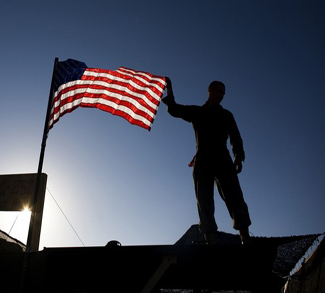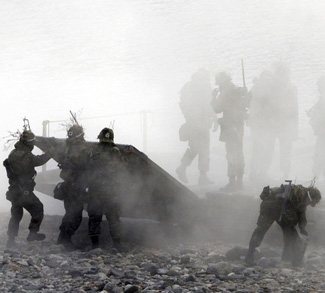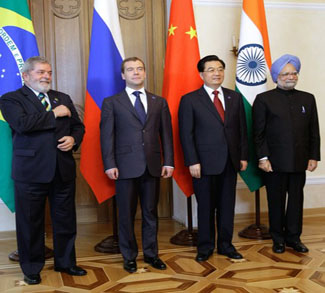FORECAST
Russia is poised to occupy the diplomatic space created in Latin America by American decline.
Broadly speaking, there are two factors that are currently harming American interests in Latin America. The first is the burden of history insofar that several governments view relations with the United States through the lens of Washington’s pseudo-colonial past. The second is American decline, or in other words, a new reality in global politics that casts the United States as one important player among several others. It follows that Latin American states now enjoy a greater degree of choice in international economic, political, and military engagements.
In many ways, Russia is a natural winner here, for its’ capital, energy reserves, international influence, and military technology represent an appealing alternative to feeding the politically unpopular perception of American dominance in the region.
Such was the dynamic at work during Russian Prime Minister Vladimir Putin’s recent visit to Venezuela. The visit resulted in the announcement of a $1 billion USD deal for a consortium of Russian energy companies to develop the Hunin-6 oil field; a reserve that could end up producing up to 450,000 barrels a day by 2017. Venezuela needs technology-intensive capital to develop its vast energy reserves and is politically averse to dealing with Washington. Consequently, Russia is able to step in as a natural partner.
The same is true in the area of defense spending, as the Putin-Chavez summit also produced new military deals that could ultimately amount to anywhere from $2-$5 billion USD. Moscow has pledged to provide Venezuela with a variety of military hardware, including: T-72 tanks, Smerch rocket launchers, and other unspecified platforms. Bolivian President Evo Morales also benefited from Vladimir Putin’s Latin American visit to the tune of $100 million USD worth of loans to buy Russian helicopters.
The political symbolism that underpins Russian re-engagement with Latin America cannot be understated. From the Rio Group’s announcement of the creation of the Community of Latin American and Caribbean States (CELC)- a regional forum that excludes the United States- to Brazil’s more recent slapping of sanctions on a variety of American trade goods, there is no shortage of evidence to show that Latin American states are committed to moving out of the shadow of their powerful neighbor to the north. Given the trend of Latin American assertiveness of late, we may see another big announcement coming down during the BRIC countries summit in Brazil in mid-April.
This issue carries symbolic weight on the Russian side as well. Re-engagement with Latin America offers Moscow an opportunity to reclaim some of the international prestige that vanished during the demise of the Soviet Union. To once again penetrate a region that carried so much weight during the Cold War caters to Russian nationalist sentiments, which just so happens to be a central pillar of Prime Minister Vladimir Putin’s political fortunes. That Putin did not cancel his scheduled trip to Venezuela after last week’s Moscow bombings is indicative of the importance that is currently being placed on engagement with Latin America.
Given the mutual benefits, symbolic potency, and the diplomatic space afforded by American decline, we should expect Russia to continue to deepen relations with Latin American states, much to the displeasure of the Obama administration. Bolivian President Morales’ calls for Russia to “return to Latin America” will likely go down in history as prophetic, because that is exactly what’s going to happen.
SUMMARY OF EVENTS: March 29th – April 5th, 2010
CENTRAL AMERICA & THE CARIBBEAN
Haiti
Donor countries attending a major fundraiser for Haiti Wednesday pledged 5.3 billions dollars for the next two years to put the quake-ravaged nation back on its feet, UN chief Ban Ki-moon announced.
LATIN AMERICA
Venezuela
Russian Prime Minister Vladimir Putin arrived here Friday to sign military and energy deals with the presidents of Venezuela and Bolivia that broaden Russia’s footprint in Latin America.
WESTERN EUROPE
European Union
The Cold War-era Western European Union defence alliance, set up in the wake of World War II, has been dissolved, the organisation’s presidency said in a statement Wednesday.
EASTERN EUROPE
Russia
A car packed with explosives blew up as police gave chase, and a bomber in a police uniform set off a second blast in a crowd of police who rushed to the scene, authorities said.
The masterminds behind a double suicide bombing on the Moscow Metro will be “destroyed”, Russian leaders have said.
MIDDLE EAST
Iraq
The former head of the UN’s chief nuclear agency, Mohammed ElBaradei, said in an interview with the British newspaper Guardian Wednesday that those who launched the war in Iraq were responsible for killing a million innocent people and could be held accountable under international law.
Iraq’s security forces were on high alert Monday after three suicide car bombs targeting regional and European embassies rocked Baghdad, killing 30 people.
Iyad Allawi, the man who won Iraq’s parliamentary elections, has accused Iran of trying to prevent him from becoming prime minister.
Iran
Iran’s top nuclear negotiator warned the West to stop “threatening” Tehran as US President Barack Obama urged Chinese President Hu Jintao to cooperate in blocking Iran’s atomic ambitions.
Western authorities are investigating whether an Iranian firm acquired valves and vacuum gauges used to enrich uranium through the representative of a Chinese firm, the Wall Street Journal reported on Saturday.
Israel
Israeli warplanes carried out at least 13 overnight air strikes on the Gaza Strip, injuring three children on Friday, Palestinian sources say.
Saudi Arabia
The head of Saudi Arabia’s central bank on Tuesday was named the first chairman of a council that will serve as the precursor to a regional central bank in the latest step toward a unified Gulf currency and greater economic integration.
SOUTH ASIA
Thailand
Tens of thousands of protesters converged on Bangkok’s shopping district on Saturday, forcing major retailers to close while accusing authorities of neglecting the poor on the 21st day of a mass rally seeking snap elections.
Afghanistan
Long the world’s largest producer of opium, the raw ingredient of heroin, Afghanistan has now become the top supplier of cannabis, with large-scale cultivation in half of its provinces, the United Nations said on Wednesday.
US President Barack Obama has arrived in Afghanistan on his first visit to the country since taking office.
Pakistan
A United Nations report into the assassination of Benazir Bhutto has been delayed at Pakistan’s request.
The Pentagon hopes “within a year” to deliver around a dozen unarmed drone aircraft to Pakistan to aid its fight against Islamic extremism, a US senior military official said Monday.
Five Pakistani soldiers and at least 21 suspected militants were killed in clashes in a region near the Afghan border where the military is pursuing Taliban insurgents fleeing a U.S.-backed offensive, authorities said Friday.
EAST ASIA
North Korea
An explosion that split in two a South Korean naval ship may have been caused by a 60-year-old sea mine, the country’s Defence Minister said, as rescuers spent a fourth day searching for 46 sailors believed to have gone down with the vessel close to the border with North Korea.
China
The build-up of Chinese military power is continuing “unabated” and Beijing’s goals appears to be power projection beyond Asia and to challenge America’s freedom of action in the region, a top US admiral has said.
AFRICA
Somalia
Heavy clashes have broken out between two rival militant groups in central Somalia, leaving at least 17 people dead and 20 injured.
Influential Muslim group have joined forces with African Union troops to wage war on al-Qaeda-linked al-Shabab military group in Somalia. The Ahlu Sunna Wal Jamaa group signed the military alliance in the African Union head quarters in Ethiopia. “We have agreed to share power [Ahlu Sunna African Union forces and Somali government forces]” Somali Prime Minister Omar Abdirashid Ali Sharmarke was quoted at the signing ceremony.
Indian authorities say they are trying to verify reports that Somali pirates have seized many Indian boats and more than 100 sailors off Somalia’s coast.
Hundreds of Somalis have marched through the streets of Mogadishu, protesting against al-Shabab militants.
DR Congo
LRA rebel fighters did not carry out a massacre in the Democratic Republic of Congo, a spokesman has said.
Guinea-Bissau
A government spokesman says Guinea-Bissau’s prime minister has been released from house arrest after an apparent coup attempt.
Zachary Fillingham is a contributor to Geopoliticalmonitor.com



